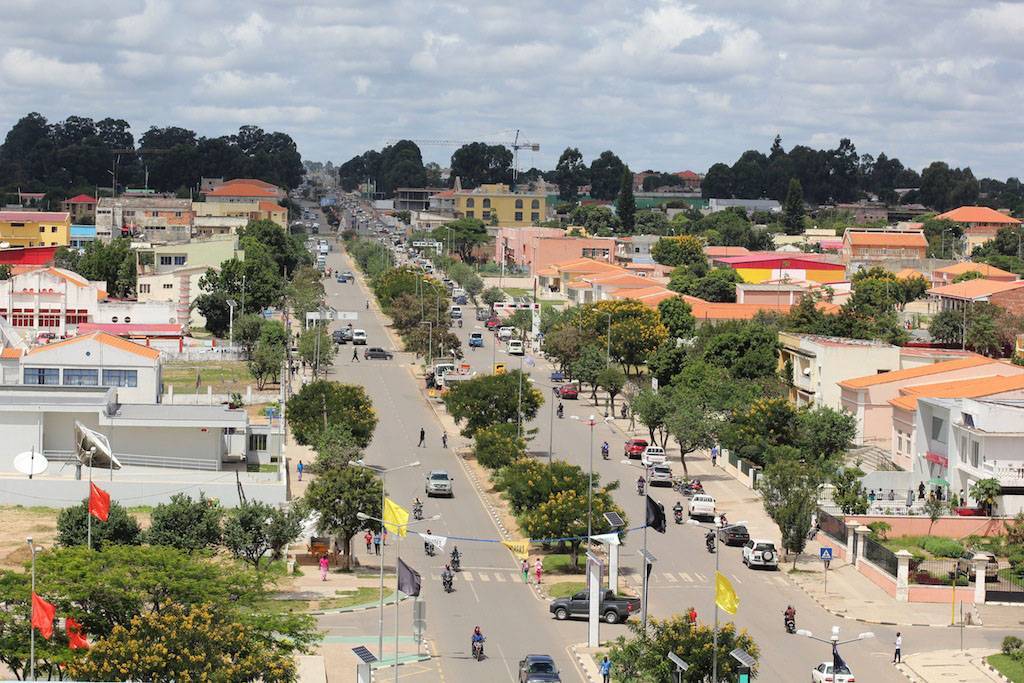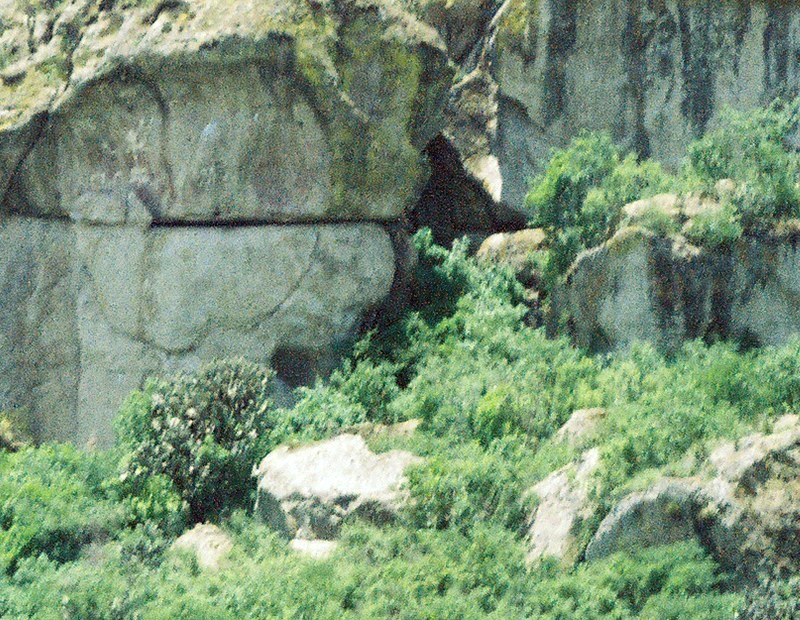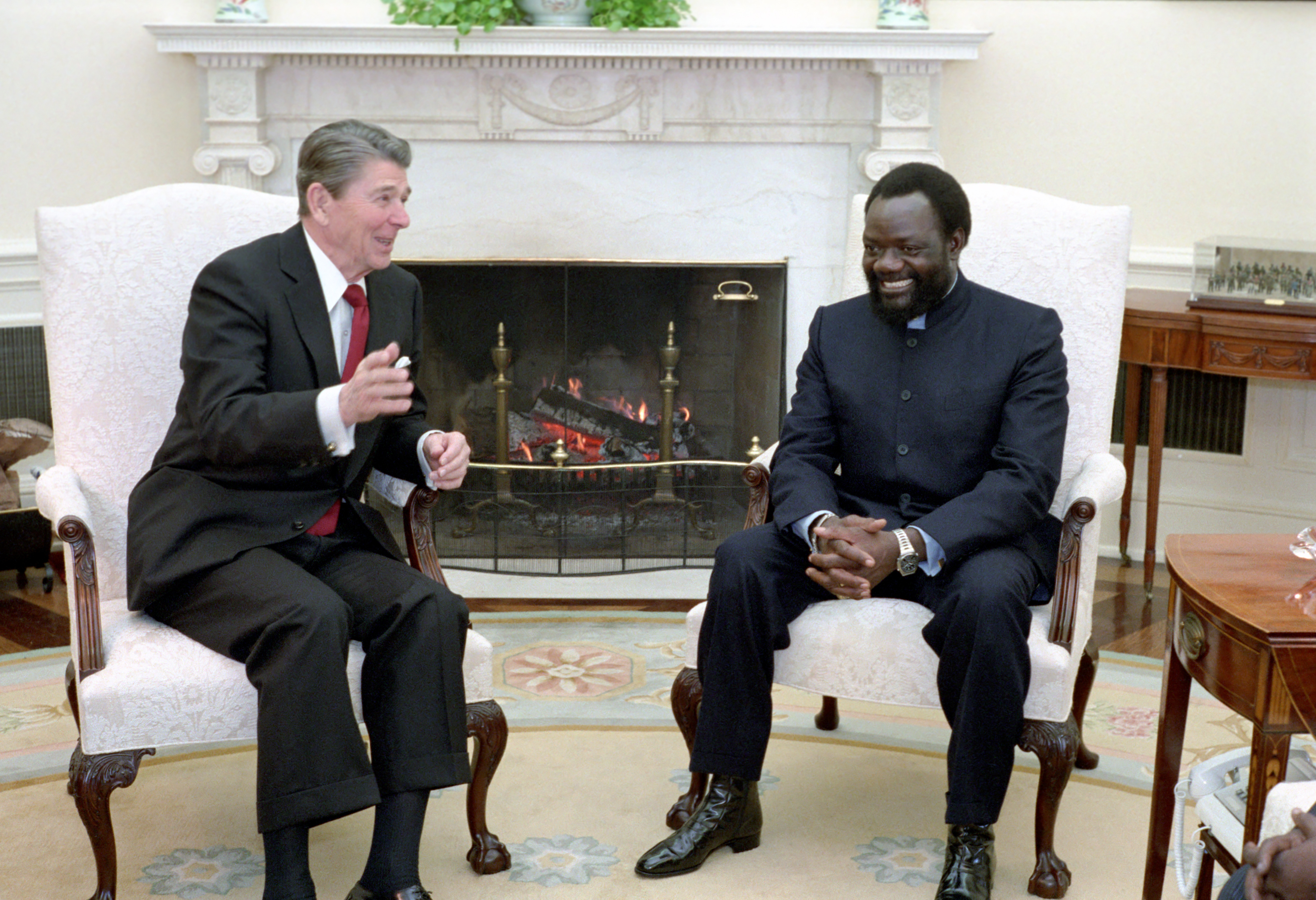|
Bié Province
Bié is a province of Angola located on the Bié Plateau in central part of country. Its capital is Kuito, which was called Silva Porto until independence from Portugal in 1975. The province has an area of and a population of 1,455,255 in 2014. The current governor of Bié is José Amaro Tati. Geography Bié has boundaries with the province of Malanje, to the northeast with the province of Lunda Sul, to Moxico, to the south with Cuando Cubango and to the west with the provinces of Huila, Huambo and Cuanza Sul. Climate The climate of Bié is cool and abundant rainfall makes it possible to farm maize, sugar cane, rice, coffee and peanuts. Its ground is among the most fertile in Angola. History The province was once an important commercial link between the Portuguese traders at the port of Benguela on the Atlantic Ocean and the Ovimbundu in the interior. The capital and other cities in the province remain important commercial centers in Angola. Origins of Jonas ... [...More Info...] [...Related Items...] OR: [Wikipedia] [Google] [Baidu] |
Provinces Of Angola
Angola is divided into eighteen provinces, known in Portuguese as ''províncias'': See also *List of provinces of Angola by Human Development Index * Municipalities of Angola * Communes of Angola The Communes of Angola ( pt, comunas) are Administrative division, administrative units in Angola after Municipalities of Angola, municipalities. The 163 municipalities of Angola are divided into communes. There are a total of 618 communes of Ang ... * ISO 3166-2:AO, the ISO codes for Angola. References Bibliography * {{Authority control Subdivisions of Angola Angola, Provinces Angola 1 Provinces, Angola Angola geography-related lists ... [...More Info...] [...Related Items...] OR: [Wikipedia] [Google] [Baidu] |
Maize
Maize ( ; ''Zea mays'' subsp. ''mays'', from es, maíz after tnq, mahiz), also known as corn ( North American and Australian English), is a cereal grain first domesticated by indigenous peoples in southern Mexico about 10,000 years ago. The leafy stalk of the plant produces pollen inflorescences (or "tassels") and separate ovuliferous inflorescences called ears that when fertilized yield kernels or seeds, which are fruits. The term ''maize'' is preferred in formal, scientific, and international usage as a common name because it refers specifically to this one grain, unlike ''corn'', which has a complex variety of meanings that vary by context and geographic region. Maize has become a staple food in many parts of the world, with the total production of maize surpassing that of wheat or rice. In addition to being consumed directly by humans (often in the form of masa), maize is also used for corn ethanol, animal feed and other maize products, such as corn starch a ... [...More Info...] [...Related Items...] OR: [Wikipedia] [Google] [Baidu] |
Cold War
The Cold War is a term commonly used to refer to a period of Geopolitics, geopolitical tension between the United States and the Soviet Union and their respective allies, the Western Bloc and the Eastern Bloc. The term ''Cold war (term), cold war'' is used because there was no large-scale fighting directly between the two superpowers, but they each supported major regional conflicts known as proxy wars. The conflict was based around the ideological and geopolitical struggle for global influence by these two superpowers, following their temporary Allies of World War II, alliance and victory against Nazi Germany and Empire of Japan, Imperial Japan in 1945. Aside from the Nuclear arms race, nuclear arsenal development and conventional military deployment, the struggle for dominance was expressed via indirect means such as psychological warfare, propaganda campaigns, Cold War espionage, espionage, far-reaching Economic sanctions, embargoes, rivalry at sports events, and technolog ... [...More Info...] [...Related Items...] OR: [Wikipedia] [Google] [Baidu] |
United States
The United States of America (U.S.A. or USA), commonly known as the United States (U.S. or US) or America, is a country primarily located in North America. It consists of 50 U.S. state, states, a Washington, D.C., federal district, five major unincorporated territories, nine United States Minor Outlying Islands, Minor Outlying Islands, and 326 Indian reservations. The United States is also in Compact of Free Association, free association with three Oceania, Pacific Island Sovereign state, sovereign states: the Federated States of Micronesia, the Marshall Islands, and the Palau, Republic of Palau. It is the world's List of countries and dependencies by area, third-largest country by both land and total area. It shares land borders Canada–United States border, with Canada to its north and Mexico–United States border, with Mexico to its south and has maritime borders with the Bahamas, Cuba, Russia, and other nations. With a population of over 333 million, it is the List of ... [...More Info...] [...Related Items...] OR: [Wikipedia] [Google] [Baidu] |
MPLA
The People's Movement for the Liberation of Angola ( pt, Movimento Popular de Libertação de Angola, Abbreviation, abbr. MPLA), for some years called the People's Movement for the Liberation of Angola – Labour Party (), is an Angolan left-wing, social democratic political party. The MPLA fought against the Portuguese army in the Angolan War of Independence from 1961 to 1974, and defeated the UNITA, National Union for the Total Independence of Angola (UNITA) and the National Liberation Front of Angola (FNLA) in the Angolan Civil War. The party has ruled Angola since the country's independence from Portugal in 1975, being the ''de facto'' government throughout the civil war and continuing to rule afterwards. Formation On 10 December 1956, in Estado Novo (Portugal), Estado Novo-ruled Portuguese Angola, the underground Angolan Communist Party (PCA) merged with the Party of the United Struggle for Africans in Angola (PLUA) to form the People's Movement for the Liberation of Angola ... [...More Info...] [...Related Items...] OR: [Wikipedia] [Google] [Baidu] |
Civil War In Angola
The Angolan Civil War ( pt, Guerra Civil Angolana) was a civil war in Angola, beginning in 1975 and continuing, with interludes, until 2002. The war immediately began after Angola became independent from Portugal in November 1975. The war was a power struggle between two former anti-colonial guerrilla movements, the communist People's Movement for the Liberation of Angola (MPLA) and the turned anti-communist National Union for the Total Independence of Angola (UNITA). The war was used as a surrogate battleground for the Cold War by rival states such as the Soviet Union, Cuba, South Africa, and the United States. The MPLA and UNITA had different roots in Angolan society and mutually incompatible leaderships, despite their shared aim of ending colonial rule. A third movement, the National Front for the Liberation of Angola (FNLA), having fought the MPLA with UNITA during the war for independence, played almost no role in the Civil War. Additionally, the Front for the ... [...More Info...] [...Related Items...] OR: [Wikipedia] [Google] [Baidu] |
UNITA
The National Union for the Total Independence of Angola ( pt, União Nacional para a Independência Total de Angola, abbr. UNITA) is the second-largest political party in Angola. Founded in 1966, UNITA fought alongside the Popular Movement for the Liberation of Angola (MPLA) in the Angolan War for Independence (1961–1975) and then against the MPLA in the ensuing civil war (1975–2002). The war was one of the most prominent Cold War proxy wars, with UNITA receiving military aid initially from People's Republic of China from 1966 until October 1975 and later from the United States and apartheid South Africa while the MPLA received support from the Soviet Union and its allies, especially Cuba. Until 1996, UNITA was funded through Angolan diamond mines in both Lunda Norte and Lunda Sul along the Cuango River valley, especially the Catoca mine, which was Angola's only Kimberlite mine at that time. Valdemar Chidondo served as Chief of Staff in the government of UNITA, pro ... [...More Info...] [...Related Items...] OR: [Wikipedia] [Google] [Baidu] |
Jonas Savimbi
Jonas Malheiro Savimbi (; 3 August 1934 – 22 February 2002) was an Angolan revolutionary politician and rebel military leader who founded and led the National Union for the Total Independence of Angola (UNITA). UNITA waged a guerrilla war against Portuguese colonial rule from 1966 to 1974, then confronted the People's Movement for the Liberation of Angola (MPLA) during the Angolan Civil War. Savimbi was killed in a clash with government troops in 2002. Early life Savimbi was born in Munhango, Bié Province, a small town on the Benguela Railway, and raised in Chilesso, in the same province. Savimbi's father, Lote, was a stationmaster on Angola's Benguela railway line and a preacher of the Protestant ''Igreja Evangélica Congregacional de Angola (Evangelical Congregational Church of Angola)'', founded and maintained by American missionaries. Both his parents were members of the Bieno group of the Ovimbundu, the people who later served as Savimbi's major political base.. In ... [...More Info...] [...Related Items...] OR: [Wikipedia] [Google] [Baidu] |
Ovimbundu
The Ovimbundu, also known as the Southern Mbundu, are a Bantu ethnic group who live on the Bié Plateau of central Angola and in the coastal strip west of these highlands. As the largest ethnic group in Angola, they make up 38 percent of the country's population. Overwhelmingly the Ovimbundu follow Christianity, mainly the ''Igreja Evangélica Congregacional de Angola (IECA)'', founded by American missionaries, and the Catholic Church. However, some still retain beliefs and practices from African traditional religions. History The origins of the Ovimbundu are Bantu populations who drifted in from the North, over the last millennium, and formed local/regional groups which slowly became political units and foci of social identity: M'Balundu, Sele, Wambo, Bieno and others. They developed a sophisticated agriculture, completed by the breeding of small animals (chicken, goats, swine) as well as of a modicum of cows bought from the farmer-herders to the South (Nyaneka-Nkhumbi, ... [...More Info...] [...Related Items...] OR: [Wikipedia] [Google] [Baidu] |
Atlantic Ocean
The Atlantic Ocean is the second-largest of the world's five oceans, with an area of about . It covers approximately 20% of Earth#Surface, Earth's surface and about 29% of its water surface area. It is known to separate the "Old World" of Africa, Europe and Asia from the "New World" of the Americas in the European perception of Earth, the World. The Atlantic Ocean occupies an elongated, S-shaped basin extending longitudinally between Europe and Africa to the east, and North America, North and South America to the west. As one component of the interconnected World Ocean, it is connected in the north to the Arctic Ocean, to the Pacific Ocean in the southwest, the Indian Ocean in the southeast, and the Southern Ocean in the south (other definitions describe the Atlantic as extending southward to Antarctica). The Atlantic Ocean is divided in two parts, by the Equatorial Counter Current, with the North(ern) Atlantic Ocean and the South(ern) Atlantic Ocean split at about 8th paralle ... [...More Info...] [...Related Items...] OR: [Wikipedia] [Google] [Baidu] |
Benguela
Benguela (; Umbundu: Luombaka) is a city in western Angola, capital of Benguela Province. Benguela is one of Angola's most populous cities with a population of 555,124 in the city and 561,775 in the municipality, at the 2014 census. History Portuguese rule Benguela was founded in 1617 as ''São Felipe de Benguela'' by the Portuguese under Manuel Cerveira Pereira, 8th Governor of Angola (1604–1607). It was long the centre of an important trade, especially in slaves to Brazil and Cuba. Ships anchored about off the shore, in depths of and transferred loads to smaller boats which used five or six jetties in the town. However, the nearby deep-water sheltered harbour of Lobito was a much larger port. Besides the churches of S. Felipe and S. António, the hospital, and the fortress, as of 1911 there were only a few stone-built houses. A short way beyond Benguela is Baía Farta, where salt was manufactured and sulphur was extracted. Close to Baia Farta was the beach of Ba ... [...More Info...] [...Related Items...] OR: [Wikipedia] [Google] [Baidu] |
Peanut
The peanut (''Arachis hypogaea''), also known as the groundnut, goober (US), pindar (US) or monkey nut (UK), is a legume crop grown mainly for its edible Seed, seeds. It is widely grown in the tropics and subtropics, important to both small and large commercial producers. It is classified as both a grain legume and, due to its high oil content, an oil crop. World annual production of shelled peanuts was 44 million tonnes in 2016, led by China with 38% of the world total. Atypically among legume crop plants, peanut pods develop underground (geocarpy) rather than above ground. With this characteristic in mind, the botanist Carl Linnaeus gave peanuts the specific epithet ''hypogaea'', which means "under the earth." The peanut belongs to the botanical Family (biology), family Fabaceae (or Leguminosae), commonly known as the legume, bean, or pea family. Like most other legumes, peanuts harbor symbiotic Nitrogen fixation, nitrogen-fixing bacteria in root nodules. The capacity to fi ... [...More Info...] [...Related Items...] OR: [Wikipedia] [Google] [Baidu] |


.png)




